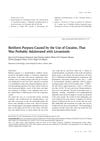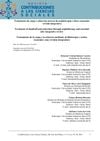 2 citations,
February 2020 in “Rivista Urologia”
2 citations,
February 2020 in “Rivista Urologia” Both terazosin and baclofen effectively reduce pain in young men with chronic testicular pain, with no difference in their effectiveness.
 2 citations,
March 2014 in “Turkderm”
2 citations,
March 2014 in “Turkderm” Mesotherapy and platelet-rich plasma treatments may help with hair loss, but their safety and effectiveness are still uncertain.
 1 citations,
September 2020 in “Actas Dermo-Sifiliográficas”
1 citations,
September 2020 in “Actas Dermo-Sifiliográficas”  1 citations,
January 2020 in “Archives of Medical Research”
1 citations,
January 2020 in “Archives of Medical Research” Formononetin, found in red clover, may treat hair loss with fewer side effects.
 1 citations,
October 2019 in “Proceedings Mulawarman Pharmaceuticals Conference”
1 citations,
October 2019 in “Proceedings Mulawarman Pharmaceuticals Conference” Aloe vera serum helps hair growth but doesn't protect from the sun.
 1 citations,
December 2017 in “Anais Brasileiros de Dermatologia”
1 citations,
December 2017 in “Anais Brasileiros de Dermatologia” Frontal fibrosing alopecia can mimic traction alopecia but has distinct features like facial papules and eyebrow thinning.
 1 citations,
June 2016 in “Yāftah/hā-yi nuvīn dar ̒ulūm-i zīstī”
1 citations,
June 2016 in “Yāftah/hā-yi nuvīn dar ̒ulūm-i zīstī” Sheep testis extract significantly improves wound healing and hair growth in rats.
 1 citations,
January 2015 in “Annals of Dermatology”
1 citations,
January 2015 in “Annals of Dermatology” Cocaine possibly mixed with levamisole caused a woman's skin condition and blood issues, which improved with treatment.
 1 citations,
November 2014 in “British journal of medicine and medical research”
1 citations,
November 2014 in “British journal of medicine and medical research” PCOS and related metabolic issues often run in families.
 1 citations,
February 1994 in “Drug Investigation”
1 citations,
February 1994 in “Drug Investigation” Sulfasalazine might cause hair loss, especially in women, and stopping it can reverse the hair loss.
 August 2024 in “OSMANGAZİ JOURNAL OF MEDICINE”
August 2024 in “OSMANGAZİ JOURNAL OF MEDICINE” The visfatin GT genotype may increase the risk of Alopecia Areata.
 July 2024 in “Journal Archives of Health”
July 2024 in “Journal Archives of Health” Woolly hair is a rare genetic condition with no effective treatments.
 July 2024 in “Scholars Journal of Medical Case Reports”
July 2024 in “Scholars Journal of Medical Case Reports” Combining low-level laser therapy and exosome therapy promotes hair growth.
 June 2024 in “Bőrgyógyászati és Venerológiai Szemle”
June 2024 in “Bőrgyógyászati és Venerológiai Szemle” New treatments for hair loss, like JAK inhibitors, PRP, anti-androgens, and minoxidil, offer better options.
 April 2024 in “Contribuciones a las ciencias sociales”
April 2024 in “Contribuciones a las ciencias sociales” Combining essential oils with clay therapy effectively treats dandruff and seborrhea.

Toxoplasma gondii infection may increase testosterone levels in males.
 February 2024 in “PloS one”
February 2024 in “PloS one” Tofacitinib and adalimumab are promising treatments for cicatricial alopecia with few side effects.
 November 2023 in “Cermin Dunia Kedokteran”
November 2023 in “Cermin Dunia Kedokteran” Tinea capitis can affect mental health, but treatment improves both health and well-being.
 February 2023 in “Journal of clinical medicine research”
February 2023 in “Journal of clinical medicine research” Zinc acetate hydrate may help reduce fatigue and hair loss in post-COVID-19 patients.
 October 2022 in “Más dermatología”
October 2022 in “Más dermatología” Early diagnosis and treatment are crucial for managing female hair loss effectively.

Vitamin D is crucial for skin health and managing skin diseases.

COVID-19 may be linked to hair loss called Telogen Effluvium, affecting quality of life and self-esteem.
 March 2022 in “Brazilian Journal of Health Review”
March 2022 in “Brazilian Journal of Health Review” COVID-19 can cause a type of hair loss that usually starts 3-6 months after the illness, and treatment includes stress reduction and hair care products like Minoxidil.
 August 2021 in “Research, Society and Development”
August 2021 in “Research, Society and Development” Minoxidil slightly increased hair volume more than Finasterida, but both reduced hair loss similarly.
 February 2020 in “İstanbul medical journal”
February 2020 in “İstanbul medical journal” Metformin improves early signs of heart disease in women with PCOS and raises apelin levels, but doesn't significantly change artery thickness.
 January 2019 in “The Annals of Thoracic Surgery”
January 2019 in “The Annals of Thoracic Surgery” The document concludes that careful planning and execution of facial gender affirmation surgery after at least 12 months of hormonal therapy can improve the quality of life for transgender individuals.

Early NAS level changes affect alcohol consumption vulnerability.
 April 2017 in “Journal of Pharmaceutical Investigation”
April 2017 in “Journal of Pharmaceutical Investigation” Indole-based compounds improved ovarian health in rats with PCOS, with L-Tryptophan and Tryptophol being most effective.
 August 2013 in “Actas Dermo-Sifiliográficas”
August 2013 in “Actas Dermo-Sifiliográficas” Most Cochrane Skin Group reviews are helpful for improving dermatology practices, but some lack enough evidence for clinical recommendations.
 January 2009 in “Springer eBooks”
January 2009 in “Springer eBooks” The document concludes that treating skin conditions should include psychological care and a multidisciplinary approach is essential for effective management.






























